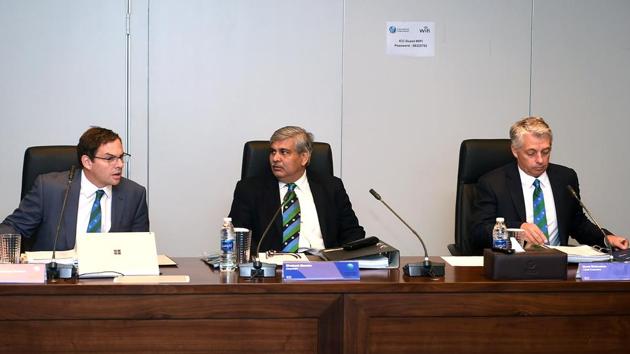Jittery BCCI declares war on ICC’s new revenue and governance model
BCCI has objected to the International Cricket Council’s (ICC) new revenue share and governance structure models. The new revenue model reduces the power of the Big Three – India, England and Australia
The Board of Control for Cricket in India (BCCI) seems to have been cornered as the Shashank Manohar-led International Cricket Council (ICC) aims to bring equality in distribution of its riches.

The Indian cricket board, outvoted during the ICC Board meeting in Dubai on Saturday, has objected to the ICC’s draft proposal on revenue share and governance.
In a press release, the BCCI said its representative Vikram Limaye expressed concern over both the documents especially in light of the insufficient time available to the Supreme Court-appointed Committee of Administrators to take an “informed view on the said proposal.”
Limaye argued that there was “no scientific basis behind the percentage distribution allocation that was being proposed other than good faith and equity”. Limaye requested that the proposals be taken up at the next ICC Board meeting in April.
When N Srinivasan was ICC chairman in 2014, he had formed a ‘Big Three’ – England and Australia being the other two – that gave BCCI the lion’s share of ICC’s profits. All that could change now.
When Manohar put the new proposals to vote on Saturday, only Sri Lanka voted for India. It is learnt Zimbabwe and Bangladesh abstained from voting. Interestingly, Australia and England, India’s allies during the Srinivasan regime, voted against the BCCI.
During the ICC meeting, which started on Thursday, Manohar, never friends with Srinivasan, had promised a complete review of the resolutions and constitutional changes made in 2014.
The new financial model, from recommendations of the working group convened in 2016 to consider the 2014 resolutions, was developed using the guiding principle of enabling every member to grow and greater transparency.
Manohar said: “The proposals from the working group to reverse the resolutions of 2014 and deliver a revised constitution and financial model were accepted by the ICC Board and now we will work collectively to refine the detail for final sign-off in April. This also allows the new BCCI leadership appropriate time to appraise the detail and contribute.
“I want the ICC to be reasonable and fair in our approach to all 105 Members and the revised constitution and financial model does that. There are still details to work through and concerns to be addressed, but the principle of change is agreed and not for debate,” Manohar, the former Indian Board president, added.





